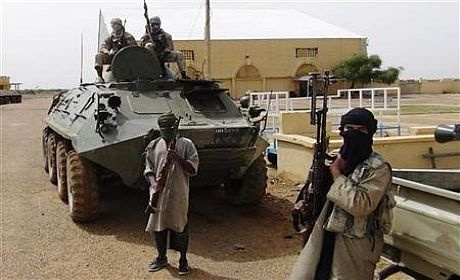A Dispatchment of Troops on the Horizon

The precedence of recent events in Mali goes back to developments in the international system. Considering their "sand dune" nature, radical Islamic groups, which considered Afghanistan and Iraq unsafe following the US attacks against these countries, have turned to African countries. "Sand dune" nature means that like sand dunes, they change their positions based on how the wind blows, i.e. they are not stable in their positions. Another idiom is used for these groups and that is that these groups have found a "McDonald’s" state, meaning that they have branches throughout the entire world and they have expanded the realm of their threats. Today, al-Qaeda’s threats are not limited to Afghanistan, and they can even be felt in the US and Europe. Al-Qaeda has created a balance of fear in all countries where no country feels safe and secure with regard to this group's influence.
But the presence of al-Qaeda and other radical groups in Africa goes back to the developments in Iraq. Following the formation of the government in Iraq and the establishment of order in this country, many radical groups migrated to northern Africa and the Sahara desert region. The Sahara desert region, including countries such as Chad, Libya, Algeria, Niger, Mali, and Mauritania, are the best places for the activities of such groups. These groups established themselves in this region and, in 2007, announced that their group's name is Al-Qaeda in the Islamic Maghreb. They called themselves al-Qaeda because they had critical views of the West's presence. One of the ideological principles of al-Qaeda is that wherever the West, particularly the US, is present, they must fight against the external symbols of this presence. They declared that the governments and leaders of all countries of North Africa, including Egypt, Tunisia, Libya, Algeria, and Morocco, have inclinations towards the West and that killing the leaders of these countries is religiously permitted. The bases of these groups were located in the Sahara desert region, especially in the border area between Mali and Algeria.
The developments which occurred in North Africa caused many of these groups, which had left Libya through NATO intervention, to move towards Algeria. The south of Algeria and the north of Mali became the major bases of these forces. Considering the fact that the situation of the government in Algeria is relatively stable, because on one hand it has oil revenues and relations with the West on the other, these groups were not able to fight against the government. On the other hand, problems in Mali caused these groups to launch a coup d’état in this country. In this coup d’état, part of the military launched a coup against another part of the military. This meant that part of the al-Qaeda forces and the army used this atmosphere and took the northern region of Mali out of the control of the government. Then, they announced that they cooperate with the Movement for Oneness and Jihad in West Africa under the name of the Ansar Dine Movement. The flag of this group is also similar to the al-Qaeda flag.
But what has happened is that a coup has been launched in Mali. Based on the rules and regulations of the African Union and the UN, any attempt to overthrow the official government of a country is illegal and if a coup is launched in a country, its government would not be recognized. As a result, the African Union suspended Mali's membership in this union, until the government was able to hold elections in part of the central region and an false government was created. But part of the same forces which were inside the government dominated the northern part. Taking northern Mali out of government domination has specific consequences. A part of these consequences is related to the regional countries and the surrounding areas, and part of them is from an international aspect. When the name al-Qaeda is mentioned, what this means for the West is that a group like al-Shabaab in Somalia might come to power and, due to the unrest which would be caused, the interests of the West would be threatened. Therefore, the West considers these groups terrorists and takes measures to fight against them. On the other hand, this region is part of western Africa and ECOWAS forces are present in this region, under the name ECOMOG. They assume that the presence of al-Qaeda in this region might further spread to Mauritania, Senegal, Burkina Faso, and Benin. Thus, they announce that they are prepared to send military aid to this region. What was agreed upon in the UN and the African Union Summit was the dispatchment of 3,200 forces to this region. Furthermore, the African Union has asked the UN to enter the scene based on the UN Charter. These measures are taken due to the fear that this region might become a base for al-Qaeda.
On the other hand, Algeria is against military intervention in northern Mali. The reason is that Algeria's view is that part of these forces are present inside this country and if they are fought against militarily in Mali, all of these forces will pour into Algeria. However, if Algeria intends to react to this issue on the basis of principles, it must deal with the roots of these threats. But its short-term view is that the presence of these forces in Algeria will threaten its security. But despite Algeria's opposition, this proposal was adopted and the UN and the forces of the African Union and ECOWAS were asked to involve themselves in this matter. Besides, a part of these forces is from the Tuareg people who are present in Mali, Algeria, and Libya. The government of Algeria is concerned that attacking Mali would provoke the Tuareg inside Algeria to rebel against the central government. Nevertheless, it does not seem that these 3,200 forces will succeed in their mission.

